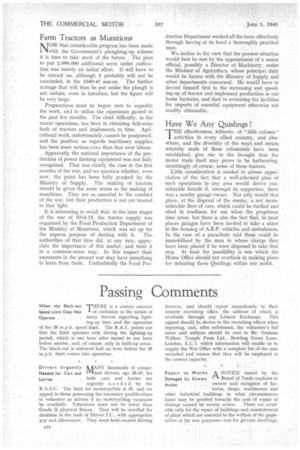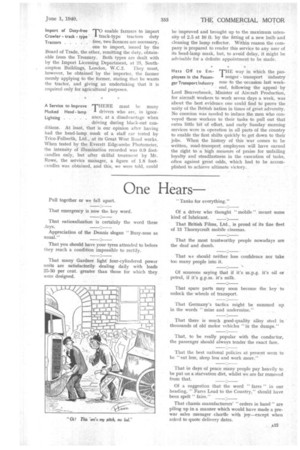Passing Comments
Page 16

Page 17

If you've noticed an error in this article please click here to report it so we can fix it.
When THERE is a certain amount I of confusion in the minds of many drivers regarding lighting-up time and the operation of the 20 m.p.h. speed limit. The R.A.C. points out that the limit operates only during the lighting-up period, which is one hour after sunset to one hour before sunrise, and, of course, only in built-up areas. The black-out is enforced half an hour before the 20 m.p.h. limit comes into operation.
the Black-out Speed Limit Does Not Operate
Drivers Urgently MANY thousands of compeNeeded for Cars and 1 vitent drivers, age 28-55, for Lorries both cars and lorries are
urgently needed by the R.A.S.C. The limit for motorcyclists is 35, and we appeal to those possessing the necessary qualifications to volunteer as drivers if no motorcycling vacancies be available. Volunteers must not be lower than Grade II physical fitness. They will be enrolled for duration in the rank of Driver I.C., with appropriate pay and allowances. They must hold current driving a.14 licences, and should report immediately to their nearest recruiting office, the address of which is available through any Labour Exchange. This appeal should be shown to the recruiting officer when reporting, and, after enlistment, the volunteer's full name and address should be sent to Mr. Graham Walker, Temple Press Ltd., Bowling Green Lane, London, E.C.1, which information will enable us to supply the War Office with a complete list of the men recruited and ensure that they will be employed in the correct capacity.
Repair to Works Damaged by Enemy
Action ANOTICE issued by the
owners and occupiers of facBoard of Trade explains to tories, shops, warehouses and other industrial buildings in what circumstances loans may be granted towards the cost of repair of damage caused by enemy action. These are avail. able only for the repair of buildings and reinstatement of plant which are essential to the welfare of the population or for war purposes—not for private dwellings.
Import of Duty-free TO enable farmers to import Crawler track type 1 track-type tractors duty
Tractors free, two licences are necessary, one to import, issued by the Board of Trade, the other, remitting the duty, obtainable from the Treasury. Both types are dealt with by the Import Licensing Department, at 25, Southampton Buildings, London, W.C.2. They must, however, be obtained by the importer, the farmer merely applying to the former, stating that he wants the tractor, and giving an undertaking that it is required only for agricultural purposes.
A Service to Improve -r'HERE must be many Masked Head lamp 1 drivers who are, in ignor
Lig hting ance, at a disadvantage when driving during black-out conditions. At least, that is our opinion after having had the head-lamp mask of a stall car tested by Trico-Folberth, Ltd., at its Great West Road works. When tested by the Everett Edgcumbe Photometer, the intensity of illumination recorded was 0.9 footcandles only, but after skilful treatment by Mr. Rowe, the service manager, a figure of 1.8 footcandles was obtained, and this, we were told, could be improved and brought up to the maximum intensity of 2.5 at 10 ft. by the fitting of a new bulb and cleaning the lamp reflector. Within reason the company is prepared to render this service to any user of its head-lamp mask, but, to avoid delay, it might be advisable for a definite appointment to be made.
Hats Off to Em-THE way in which the pas ployees in the Passensenger transport industry ger Transport Industry rose to the -occasion last week . end, following the appeal by Lord Beaverbrook, Minister of Aircraft Production, for aircraft workers to work seven days a week, was about the best evidence one could find to prove the unity of the British hation in times of great adversity. No coercion was needed to induce the men who conveyed these workers to their tasks to pull out that extra little bit of effort, and early Sunday morning services were in operation in all parts of the Country to enable the first shifts quickly to get down to their jobs. When the history of this war comes to be written, road-transport employees will have earned the right to a high measure of praise for unfailing loyalty and steadfastness in the execution of tasks, often against great odds, which had to be accomplished to achieve ultimate victory.




























































